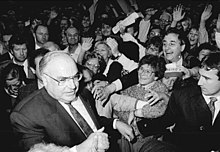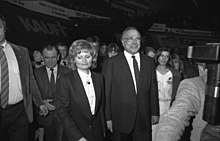Helmut Kohl
As Chancellor, Kohl was committed to European integration and especially to the Franco-German relationship; he was also a steadfast ally of the United States and supported Ronald Reagan's more aggressive policies to weaken the Soviet Union.
[1] Kohl was also a central figure in the eastern enlargement of the EU, and his government led the effort to push for international recognition of Croatia, Slovenia, and Bosnia and Herzegovina when the states declared independence.
[33] As a member of the board and the executive committee, Kohl pushed towards party reform, supporting liberal stances in education and social policies, including employee participation.
[38] Facing stiff opposition from the left wing of the party, Kohl initially expected only to serve as chairman for a couple of months, as his critics planned to replace him at another convention set for November in Hamburg.
What placed Kohl, who intended to run for chancellor, under increased pressure was the fact that the sister parties of CDU and CSU were set to decide upon their leading candidate for the upcoming federal elections in mid-1975.
[46] Strauß took the discord as a starting point to evaluate chances of expanding the CSU on the federal level, such as having separate electoral lists in the states of North Rhine-Westphalia, Lower Saxony, Hamburg, and Bremen.
Some opposition members of the Bundestag, angered by what SPD figures in the Hessian regional elections had called the FDP's 'betrayal in Bonn', asked the Federal Constitutional Court to declare the whole proceeding unconstitutional.
[53] In 1985, Kohl and US president Ronald Reagan, as part of a plan to observe the 40th anniversary of V-E Day, saw an opportunity to demonstrate the strength of the friendship that existed between Germany and its former foe.
In 1984, a Mother and Child Fund was established, providing discretionary grants "to forestall abortions on grounds of material hardship," and in 1986 a 10 Bn DM package of Erziehungsgeld (childcare allowance) was introduced, although according to various studies, this latter initiative was heavily counterbalanced by cuts.
One month later, the Party of Democratic Socialism – the renamed SED – was roundly defeated by a grand coalition headed by the East German counterpart of Kohl's CDU, which ran on a platform of speedy reunification.
At midnight Central European Time on 3 October 1990, East Germany officially ceased to exist, and its territory joined the Federal Republic as the five states of Brandenburg, Mecklenburg-Vorpommern, Saxony, Saxony-Anhalt and Thuringia.
After the fall of the Berlin Wall, Kohl affirmed that former German territories east of the Oder-Neisse line were definitively part of Poland, thereby relinquishing any claim Germany had to them in a treaty signed on 14 November 1990 in Warsaw.
Though, earlier in March of that year, Kohl caused a diplomatic firestorm when he suggested that a reunified Germany would not accept the Oder–Neisse line, and implied that the Federal Republic might wish to restore the frontier of 1937, by force if necessary.
In late February 2008, Kohl suffered a stroke in combination with a fall which caused serious head injuries and required his hospitalisation, after which he was reported to be using a wheelchair due to partial paralysis and having difficulty speaking.
The two had a one-hour conversation and released a joint press statement regarding the 2015 European migrant crisis, saying they doubted that Europe was capable of continuing to absorb refugees indefinitely.
[103] Before the meeting, it had widely been interpreted as criticism of Angela Merkel's handling of the crisis,[104][105] but Kohl and Orbán refrained from attacking the chancellor directly, writing: "It is about a good future for Europe and peace in the world.
[108] He had a strained relationship with British prime minister and fellow conservative Margaret Thatcher,[109][110] although Kohl did allow her secret access to his plans on reunification in March 1990,[111] to allay the concerns she shared with Mitterrand.
[112] Kohl faced stiff opposition from the West German political left and was mocked for his large physical stature, alleged provinciality, simplistic language, and (slight) local Palatinate dialect including hypercorrections.
[117] Biographer Hans Peter Schwarz names five problems of the 46-year-old candidate: being unfamiliar with the complicated relations in the Bundestag group, having no international experience, having no profound knowledge of economics, but also: a lack of charisma and no cultural acceptance in Northern Germany.
Additionally, the Catholic with his Palatinate dialect, a folksy man who had culture but was no intellectual – to North German journalists (like from the important newspapers made in Hamburg, including weeklies Der Spiegel and Die Zeit) he just felt foreign, more than any previous CDU chairman.
[119] Unlike many politicians of his era, including predecessors Helmut Schmidt and Willy Brandt, successor Gerhard Schröder or rival Franz Josef Strauss, Kohl was never regarded as charismatic or media-savvy and many of his peculiar coinings were heavily lampooned and criticised.
In a study of German chancellorship as political leadership, Henrik Gast highlights how much time Kohl invested in personal relationships even with the backbenchers in the Bundestag and also party officials up to the local level.
[137] Jochen Arntz criticised Maike Richter in the Süddeutsche Zeitung in 2012 for building a "wall" around Helmut Kohl and controlling him; as a result he had also become estranged from many former friends disliked by his new wife.
Richter wanted Hungarian prime minister Viktor Orbán, who has fiercely criticised Merkel's refugee policies, to speak instead; she only relented when told it would cause a scandal.
[151] Chancellor Angela Merkel, speaking from the German Embassy in Rome, said that "this man who was great in every sense of the word—his achievement, his role as a statesman in Germany at its historical moment—it's going to take a while until we can truly assess what we have lost in his passing.
[163] Italian president Sergio Mattarella called Kohl one of Europe's founding fathers, and said that "he who was, rightly, described as 'the Chancellor of Reunification', worked with far-sightedness and determination, in years marked by deep and epochal changes in world equilibria, to give back unity to his country in the framework of the great project of European integration.
As an authentic statesman, he knew how to combine pragmatism and a capacity of vision, furnishing a courageous contribution not only to the fall of the Berlin Wall and the reunification of Germany, but also to overcoming the dramatic divisions which, for decades, had torn Europe.
[165] Former British prime minister John Major said Kohl was "a towering figure in German and European history" who "entrenched Germany in a wider Europe, in the hope of achieving a unity and peace that the continent had never known before.
"[166] British prime minister Theresa May called Kohl "a giant of European history" and said that "I pay tribute to the role he played in helping to end the Cold War and reunify Germany.
"[157] UN secretary-general António Guterres said Kohl had "played an instrumental role in the peaceful reunification of his country" and that "today's Europe is a product of his vision and his tenacity, in the face of enormous obstacles.
















